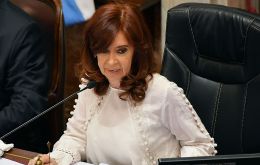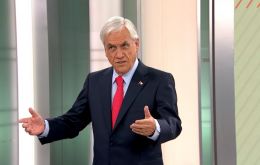MercoPress. South Atlantic News Agency
Economy
-
Saturday, April 10th 2021 - 10:53 UTC
Argentine inflation forecast at 46% for year 2021, 3.9% for March alone

Argentina's Central Bank Friday announced the yearly inflation for 2021 was expected to reach 46%, while figures for the past month of March were around 3.9%. The official peso/US dollar exchange rate was foreseen at $ 115/ US$ 1 by the end of this year.
-
Saturday, April 10th 2021 - 09:05 UTC
Paraguay grosses US $ 474 million in March for soybean exports

According to a report from Paraguay's National Customs Directorate (DNA) released Friday, exports of soybean and its derivatives bounced back in March up to 1.1 million tons, worth US $ 474.4 million.
-
Friday, April 9th 2021 - 10:54 UTC
Brazil Vice-President dubs Argentina “an eternal beggar”

In a statement supporting the government's proposed fiscal adjustment, Brazil's Vice President Hamilton Mourao Thursday labelled Argentina an “eternal beggar,” which might spark another diplomatic incident, of which the administration of President Alberto Fernández has had a handful in the past few days.
-
Friday, April 9th 2021 - 10:30 UTC
Argentina's INDEC figures “encouraging” for government, still not for people

While inflation grows rampant and people lose some or all of their income in the middle of the coronavirus restrictions, Argentina's National Institute of Statistics and Census (INDEC) Thursday released a new economic report which showed positive figures.
-
Thursday, April 8th 2021 - 10:32 UTC
IMF likely to review interest rates charged to Argentina... in due time

International Monetary Fund (IMF) Director Kristalina Georgieva Wednesday admitted the rates Argentina is currently paying will be subject to review, at the request of the South American country.
-
Wednesday, April 7th 2021 - 09:53 UTC
Patagonian hotels returned to Kirchner family as money laundering enquire reaches nowhere

Argentine Vice President Cristina Fernández de Kirchner Monday recovered all her assets which have been involved in an alleged money-laundering scheme, a federal court ruled Monday.
-
Wednesday, April 7th 2021 - 09:40 UTC
Bolsonaro and Putin discuss Sputnik-V vaccine purchase in telephone conversation

Brazil's President Jair Bolsonaro spoke Tuesday on the telephone with his Russian counterpart, Vladimir Putin, about the possible purchase of Sputnik V, the anti-Covid-19 vaccine developed by the Gamaleya Institute for Research in Epidemiology and Microbiology.
-
Tuesday, April 6th 2021 - 09:55 UTC
Uruguay formally requests meeting with Argentina to work on Mercosur's flexibilization

Uruguay's Foreign Ministry Monday submitted a formal request to the Argentine government to hold a meeting to discuss the flexibility of Mercosur, it was reported.
-
Tuesday, April 6th 2021 - 09:10 UTC
Chile's Parliament passes economic relief bill

Chile's Congress Monday passed a bill granting economic assistance to people in need and whose situation has worsened over the past few months due to the covid-19 crisis.
-
Tuesday, April 6th 2021 - 08:48 UTC
Russia's Putin invites Argentine President over to discuss bilateral cooperation

Russia's President Vladimir Putin Monday held a phone conversation with his Argentine colleague Alberto Fernández, whom he invited over to Moscow for talks to advance cooperation issues.
